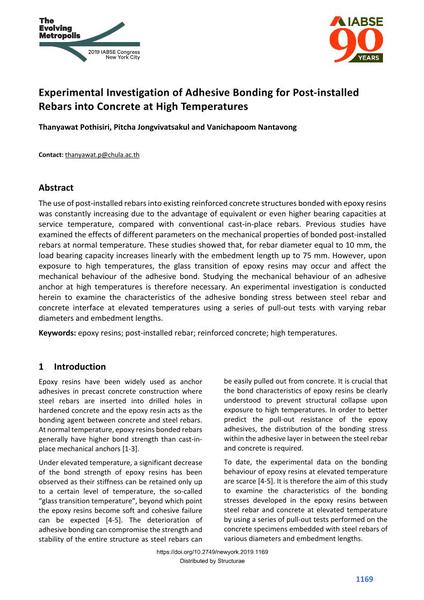Experimental Investigation of Adhesive Bonding for Post‐installed Rebars into Concrete at High Temperatures

|
|
|||||||||||
Détails bibliographiques
| Auteur(s): |
Thanyawat Pothisiri
Pitcha Jongvivatsakul Vanichapoom Nantavong |
||||
|---|---|---|---|---|---|
| Médium: | papier de conférence | ||||
| Langue(s): | anglais | ||||
| Conférence: | IABSE Congress: The Evolving Metropolis, New York, NY, USA, 4-6 September 2019 | ||||
| Publié dans: | The Evolving Metropolis | ||||
|
|||||
| Page(s): | 1169-1175 | ||||
| Nombre total de pages (du PDF): | 7 | ||||
| DOI: | 10.2749/newyork.2019.1169 | ||||
| Abstrait: |
The use of post‐installed rebars into existing reinforced concrete structures bonded with epoxy resins was constantly increasing due to the advantage of equivalent or even higher bearing capacities at service temperature, compared with conventional cast‐in‐place rebars. Previous studies have examined the effects of different parameters on the mechanical properties of bonded post‐installed rebars at normal temperature. These studies showed that, for rebar diameter equal to 10 mm, the load bearing capacity increases linearly with the embedment length up to 75 mm. However, upon exposure to high temperatures, the glass transition of epoxy resins may occur and affect the mechanical behaviour of the adhesive bond. Studying the mechanical behaviour of an adhesive anchor at high temperatures is therefore necessary. An experimental investigation is conducted herein to examine the characteristics of the adhesive bonding stress between steel rebar and concrete interface at elevated temperatures using a series of pull‐out tests with varying rebar diameters and embedment lengths. |
||||
